6种从句的区别
- 格式:doc
- 大小:59.00 KB
- 文档页数:10
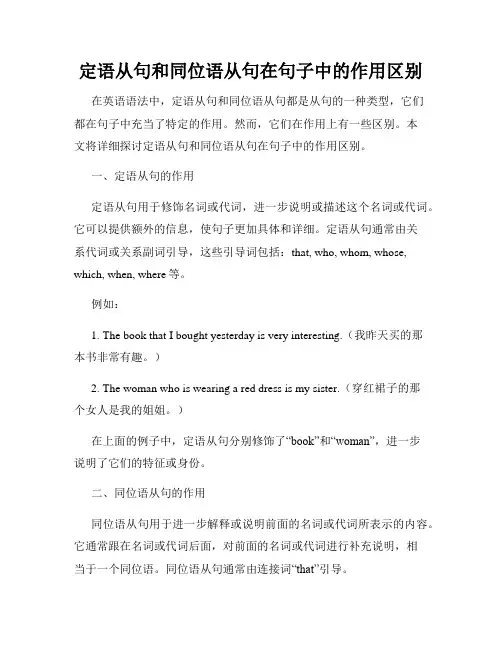
定语从句和同位语从句在句子中的作用区别在英语语法中,定语从句和同位语从句都是从句的一种类型,它们都在句子中充当了特定的作用。
然而,它们在作用上有一些区别。
本文将详细探讨定语从句和同位语从句在句子中的作用区别。
一、定语从句的作用定语从句用于修饰名词或代词,进一步说明或描述这个名词或代词。
它可以提供额外的信息,使句子更加具体和详细。
定语从句通常由关系代词或关系副词引导,这些引导词包括:that, who, whom, whose, which, when, where等。
例如:1. The book that I bought yesterday is very interesting.(我昨天买的那本书非常有趣。
)2. The woman who is wearing a red dress is my sister.(穿红裙子的那个女人是我的姐姐。
)在上面的例子中,定语从句分别修饰了“book”和“woman”,进一步说明了它们的特征或身份。
二、同位语从句的作用同位语从句用于进一步解释或说明前面的名词或代词所表示的内容。
它通常跟在名词或代词后面,对前面的名词或代词进行补充说明,相当于一个同位语。
同位语从句通常由连接词“that”引导。
例如:1. The news that he won the lottery surprised everyone.(他赢得彩票的消息让每个人都感到惊讶。
)2. My belief is that hard work leads to success.(我的信念是努力工作会带来成功。
)在上述例子中,同位语从句分别对应了前面的名词“news”和“belief”,进一步解释了它们所代表的具体内容。
三、定语从句和同位语从句的区别1. 句子结构:定语从句在句子中充当修饰成分,通常放在被修饰的名词或代词后面。
而同位语从句本身是对前面名词或代词的解释,其结构相对独立,常常放在名词或代词后面作进一步解释。
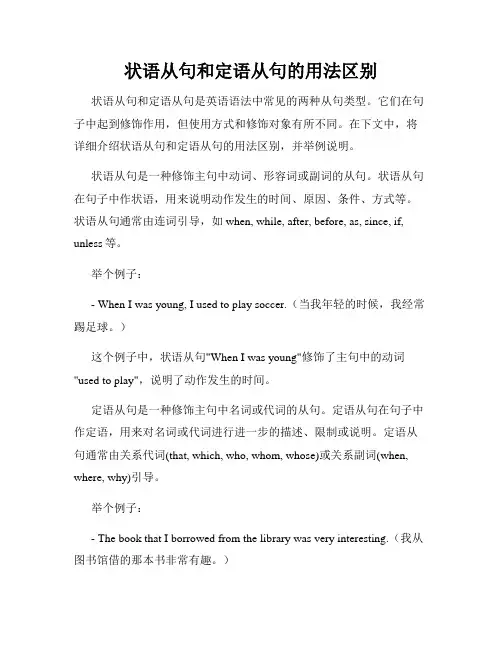
状语从句和定语从句的用法区别状语从句和定语从句是英语语法中常见的两种从句类型。
它们在句子中起到修饰作用,但使用方式和修饰对象有所不同。
在下文中,将详细介绍状语从句和定语从句的用法区别,并举例说明。
状语从句是一种修饰主句中动词、形容词或副词的从句。
状语从句在句子中作状语,用来说明动作发生的时间、原因、条件、方式等。
状语从句通常由连词引导,如when, while, after, before, as, since, if, unless等。
举个例子:- When I was young, I used to play soccer.(当我年轻的时候,我经常踢足球。
)这个例子中,状语从句"When I was young"修饰了主句中的动词"used to play",说明了动作发生的时间。
定语从句是一种修饰主句中名词或代词的从句。
定语从句在句子中作定语,用来对名词或代词进行进一步的描述、限制或说明。
定语从句通常由关系代词(that, which, who, whom, whose)或关系副词(when, where, why)引导。
举个例子:- The book that I borrowed from the library was very interesting.(我从图书馆借的那本书非常有趣。
)这个例子中,定语从句"that I borrowed from the library"修饰了主句中的名词"book",对其进行了进一步的说明。
状语从句和定语从句的区别主要体现在以下几个方面:1. 功能不同:- 状语从句用来表示动作发生的时间、原因、条件、方式等,对主句中的动词、形容词或副词进行修饰;- 定语从句用来对主句中的名词或代词进行描述、限制或说明。
2. 引导词不同:- 状语从句由连词引导,如when, while, after, before, as, since, if, unless等;- 定语从句由关系代词或关系副词引导,如that, which, who, whom, whose, when, where, why等。
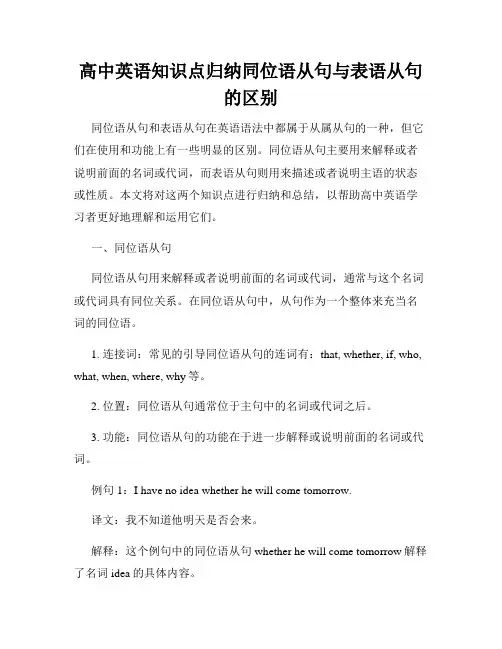
高中英语知识点归纳同位语从句与表语从句的区别同位语从句和表语从句在英语语法中都属于从属从句的一种,但它们在使用和功能上有一些明显的区别。
同位语从句主要用来解释或者说明前面的名词或代词,而表语从句则用来描述或者说明主语的状态或性质。
本文将对这两个知识点进行归纳和总结,以帮助高中英语学习者更好地理解和运用它们。
一、同位语从句同位语从句用来解释或者说明前面的名词或代词,通常与这个名词或代词具有同位关系。
在同位语从句中,从句作为一个整体来充当名词的同位语。
1. 连接词:常见的引导同位语从句的连词有:that, whether, if, who, what, when, where, why等。
2. 位置:同位语从句通常位于主句中的名词或代词之后。
3. 功能:同位语从句的功能在于进一步解释或说明前面的名词或代词。
例句1:I have no idea whether he will come tomorrow.译文:我不知道他明天是否会来。
解释:这个例句中的同位语从句whether he will come tomorrow解释了名词idea的具体内容。
例句2:She asked me if I had finished my homework.译文:她问我是否完成了作业。
解释:这个例句中的同位语从句if I had finished my homework解释了名词asked的具体内容。
二、表语从句表语从句用来描述或者说明主语的状态或性质,通常与主语之间具有被动关系。
在表语从句中,从句的主语必须和主句的主语保持一致。
1. 连接词:常见的引导表语从句的连词有:that, whether, if, who, what, when, where, why等。
2. 位置:表语从句通常位于系动词(be动词、感官动词、使役动词等)之后。
3. 功能:表语从句的功能在于描述或者说明主语的状态或性质。
例句3:The fact is that he is not coming to the party.译文:事实是他不来参加聚会。
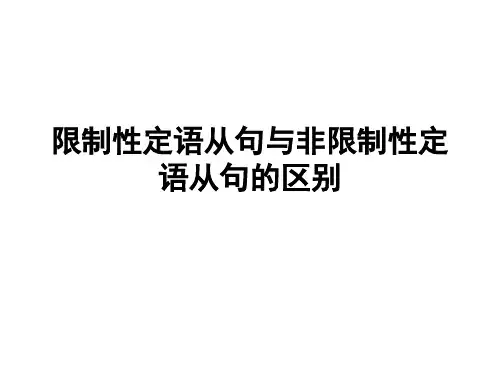
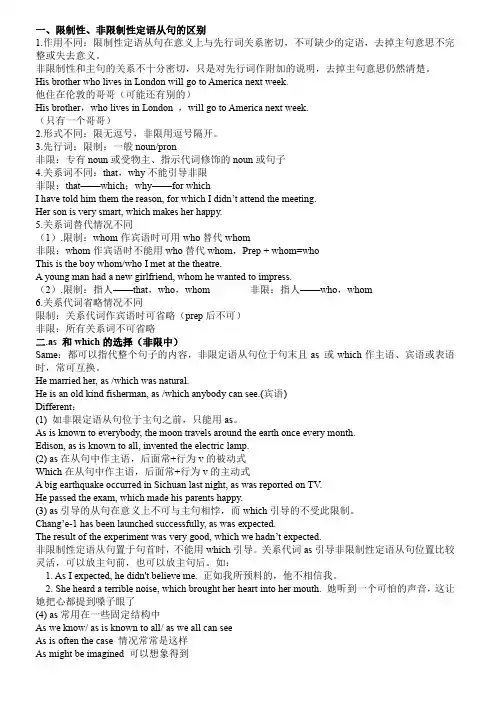
一、限制性、非限制性定语从句的区别1.作用不同:限制性定语从句在意义上与先行词关系密切,不可缺少的定语,去掉主句意思不完整或失去意义。
非限制性和主句的关系不十分密切,只是对先行词作附加的说明,去掉主句意思仍然清楚。
His brother who lives in London will go to America next week.他住在伦敦的哥哥(可能还有别的)His brother,who lives in London ,will go to America next week.(只有一个哥哥)2.形式不同:限无逗号,非限用逗号隔开。
3.先行词:限制:一般noun/pron非限:专有noun或受物主、指示代词修饰的noun或句子4.关系词不同:that,why不能引导非限非限:that——which;why——for whichI have told him them the reason, for which I didn’t attend the meeting.Her son is very smart, which makes her happy.5.关系词替代情况不同(1).限制:whom作宾语时可用who替代whom非限:whom作宾语时不能用who替代whom,Prep + whom=whoThis is the boy whom/who I met at the theatre.A young man had a new girlfriend, whom he wanted to impress.(2).限制:指人——that,who,whom 非限:指人——who,whom6.关系代词省略情况不同限制:关系代词作宾语时可省略(prep后不可)非限:所有关系词不可省略二.as 和which的选择(非限中)Same:都可以指代整个句子的内容,非限定语从句位于句末且as 或which作主语、宾语或表语时,常可互换。
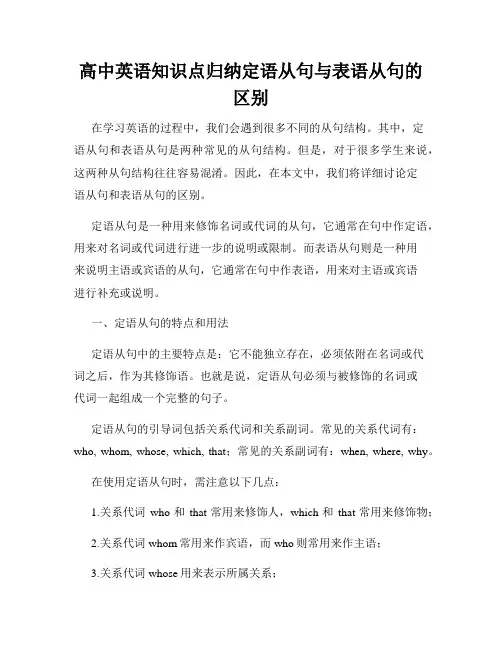
高中英语知识点归纳定语从句与表语从句的区别在学习英语的过程中,我们会遇到很多不同的从句结构。
其中,定语从句和表语从句是两种常见的从句结构。
但是,对于很多学生来说,这两种从句结构往往容易混淆。
因此,在本文中,我们将详细讨论定语从句和表语从句的区别。
定语从句是一种用来修饰名词或代词的从句,它通常在句中作定语,用来对名词或代词进行进一步的说明或限制。
而表语从句则是一种用来说明主语或宾语的从句,它通常在句中作表语,用来对主语或宾语进行补充或说明。
一、定语从句的特点和用法定语从句中的主要特点是:它不能独立存在,必须依附在名词或代词之后,作为其修饰语。
也就是说,定语从句必须与被修饰的名词或代词一起组成一个完整的句子。
定语从句的引导词包括关系代词和关系副词。
常见的关系代词有:who, whom, whose, which, that;常见的关系副词有:when, where, why。
在使用定语从句时,需注意以下几点:1.关系代词who和that常用来修饰人,which和that常用来修饰物;2.关系代词whom常用来作宾语,而who则常用来作主语;3.关系代词whose用来表示所属关系;4.关系副词when用来表示时间,where用来表示地点,why用来表示原因。
下面是一些例句来帮助我们理解定语从句的用法:1. The boy who is standing over there is my brother.(那个站在那里的男孩是我弟弟。
)2. The book which I borrowed from the library is very interesting.(我从图书馆借来的那本书非常有趣。
)3. The house whose windows are broken is abandoned.(那所窗户破碎的房子已经废弃了。
)4. This is the reason why I couldn't come to the party.(这就是我不能来参加聚会的原因。
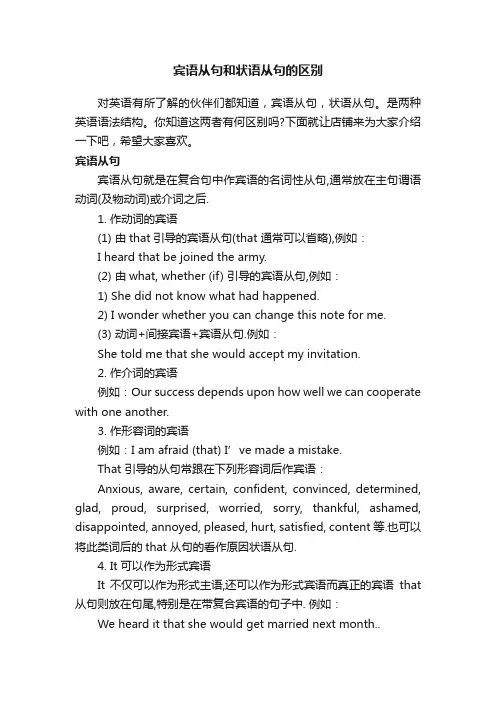
宾语从句和状语从句的区别对英语有所了解的伙伴们都知道,宾语从句,状语从句。
是两种英语语法结构。
你知道这两者有何区别吗?下面就让店铺来为大家介绍一下吧,希望大家喜欢。
宾语从句宾语从句就是在复合句中作宾语的名词性从句,通常放在主句谓语动词(及物动词)或介词之后.1. 作动词的宾语(1) 由that引导的宾语从句(that 通常可以省略),例如:I heard that be joined the army.(2) 由what, whether (if) 引导的宾语从句,例如:1) She did not know what had happened.2) I wonder whether you can change this note for me.(3) 动词+间接宾语+宾语从句.例如:She told me that she would accept my invitation.2. 作介词的宾语例如:Our success depends upon how well we can cooperate with one another.3. 作形容词的宾语例如:I am afraid (that) I’ve made a mistake.That 引导的从句常跟在下列形容词后作宾语:Anxious, aware, certain, confident, convinced, determined, glad, proud, surprised, worried, sorry, thankful, ashamed, disappointed, annoyed, pleased, hurt, satisfied, content 等.也可以将此类词后的that 从句的看作原因状语从句.4. It 可以作为形式宾语It 不仅可以作为形式主语,还可以作为形式宾语而真正的宾语that 从句则放在句尾,特别是在带复合宾语的句子中. 例如:We heard it that she would get married next month..5. 后边不能直接跟that 从句的动词这类动词有Allow, refuse, let, like, cause, force, admire, condemn, celebrate, dislike, love, help, take, forgive等.这类词后可以用不定式或动名词作宾语,但不可以用that引导的宾语从句.例如:I admire their winning the match. (right)I admire that they won the match. (wrong)6. 不可用that从句作直接宾语的动词有些动词不可用于“动词+间接宾语+that从句“结构中,常见的有Envy, order, accuse, refuse, impress, forgive, blame, denounce, advise, congratulate等.例如:He impressed the manager as an honest man. (right)He impressed the manager that he was an honest man. (wrong)7. 否定的转移若主句谓语动词为Think, consider, wuppose, believe, expect, fancy, guess, imagine等,其后的宾语从句若含有否定意义,一般要把否定词转移到主句谓语上,从句谓语用肯定式.例如:I don’t think this dress fits you well.(我认为这件衣服不适合你穿.)状语从句(Adverbial Clause)一状语从句的种类§ 1状语从句的种类用来修饰谓语动词、其它动词、定语、状语或整个句子的从句叫做状语从句.状语从句可分为:1.时间状语从句;(adverbial clause of time)2.地点状语从句;(adverbial clause of place)3.原因状语从句;(adverbial clause of cause)4.条件状语从句;(adverbial clause of condition)5.目的状语从句;(adverbial clause of purpose)6.让步状语从句;(adverbial clause of concession)7.比较状语从句;(adverbial clause of comparison)8.程度状语从句;(adverbial clause of degree)9.方式状语从句;(adverbial clause of manner)10.结果状语从句.(adverbial clause of result)§2状语从句的时态特点一般情况下,时间和条件状语从句的谓语动词一般用“一般现在时”表示“一般将来时”,用“现在完成时”表示“将来完成时”.例如:I will call you as soon as I arrive in Beijing. 我一到北京就给你打电话.(这是由as soon as引导的时间状语从句,从句中的谓语动词arrive是一般现在时,表示一般将来时,决不可用will arrive)As soon as I have finished this work, I will go home. 我一完成此工作,就回家.(从句中的谓语动词用现在完成时have finished,表示将来完成时,决不可用will have finished)If he comes back, please let me know.如果他回来了,请通知我.(从句中的谓语动词用comes back,表示一般将来时,决不可用will come back)二时间状语从句§3时间状语从句(adverbial clause of time)1.由when, while, as引导的时间状语从句.例如:When you think you know nothing, then you begin to know something.当你以为自己一无所知的时候,你就是在开始知道一些事物了.When truth is buried under the ground it grows, it chokes, it gathers such an explosive force that on the day it bursts out , it blows up everything with it.当真理被埋在地下的时候,它在生长,它感到压抑,它蓄存着这么一种爆炸性力量,一旦冒出,它就会炸破一切!Strike while the iron is hot. 趁热打铁.Will you watch my clothes while I have a swim. 我游泳的时候,请你照看一下我的衣服.You can feel the air moving as your hand pushes through it. 当你的手在空气中挥动的时候,你就能感觉到空气在流动.Our headmaster laughed as she spoke.我们的校长边谈边笑.【区别】when, while和as的区别:when引导的从句的谓语动词可以是延续性的动词,又可以是瞬时动词.并且when有时表示“就在那时”.例如:When she came in, I stopped eating.她进来时,我在吃饭.(瞬时动词)When I lived in the countryside, I used to carry some water for him.当的住在农村时,我常常为他担水.(延续性的动词)We were about to leave when he came in.我们就要离开,就在那时他进来了.While引导的从句的谓语动作必须是延续性的,并强调主句和从句的动作同时发生(或者相对应).并且while有时还可以表示对比.例如:While my wife was reading the newspaper, I was watching TV. (was reading是延续性的动词,was reading和was watching同时发生)I like playing football while you like playing basketball.我喜欢踢足球,而你喜欢打篮球.(对比)As表示“一边……一边”,as引导的动作是延续性的动作,一般用于主句和从句动作同时发生;as也可以强调“一先一后.例如:We always sing as we walk.我们总是边走边唱.(as表示“一边……一边”)As we was going out, it began to snow.当我们出门时,开始下雪了.(as强调句中两个动作紧接着先后发生,而不强调开始下雪的特定时间)2.由before和after引导的时间状语从句.注意before引导的从句不再用否定式的谓语,并且当before引导的从句位于主句之后,有时译成“就,才”.还要注意主句和从句之间的时间关系.当主句用将来时,从句总是用现在时;如果before引导的从句谓语用的是过去时,则主句动词多用过去完成时,这样以便体现动作发生的先后.After表示主句动作发生在从句动作之后.主句和从句的动作的时间关系正好与before引导的从句相反.例如:It will be four days before they come back. 他们要过四天才能回来.Einstein almost knocked me down before he saw me.爱因斯坦几乎把我撞倒才看到我.My father had left for Canada just before the letter arrived.我父亲恰好在信到之前去加拿大了.They had not been married four months before they were divorced. 他们结婚还不到四个月就离婚了.After you think it over, please let me know what you decide.你仔细考虑过以后,告诉我你是怎样决定的.After we had finished the work, we went home.完成工作之后,我们回家了.(从句用过去完成时,主句用一般过去时)3.由till或until引导的时间状语从句.till和until一般情况下两者可以互换,但是在强调句型中多用until.并且要注意的是:如果主句中的谓语动词是瞬时动词时,必须用否定形式;如果主句中的谓语动词是延续性动词时,用肯定或否定形式都可以,但表达的意思不同.例如:I didn't go to bed until(till) my father came back.直到我父亲回来我才上床睡觉.It was not until the meeting was over that he began to teach me English.直到散会之后他才开始教我英语.I worked until he came back.我工作到他回来为止.I didn't work until he came back.他回来我这才开始工作.Please wait until I arrived.在我到达之前请等我.4.由since引导的时间状语从句. since引导的从句的谓语动词可以是延续性的动词,又可以是瞬时动词.一般情况下,从句谓语动词用一般过去时,而主句的谓语动词用现在完成时.但在It is +时间+since从句的句型中,主句多用一般现在时.例如:I have been in Beijing since you left. 自从你离开以来,我一直在北京了.Where have you been since I last saw you? 自上次我和你见面以后,你到哪里去了?It is four years since my sister lived in Beijing. 我妹妹不在北京住有四年了.It is five months since our boss was in Beijing.我们老板离开北京有五个月了.5.由as soon as, immediately, directly, instantly, the moment, the instant, the minute, 等引导的时间状语从句.这些连词都表示“一……就”.例如:I will go there directly I have finished my breakfast. 吃完早饭,我立即到那里去.The moment I heard the news, I hastened to the spot.我一听到消息,马上赶到了出事地点.As soon as I reach Canada, I will ring you up. 我一到加拿大,就给你来电话.【注意】hardly(scarcely, rarely)…when / before, no sooner…than相当于as soon as之意.主句用过去完成时,从句用一般过去时.当hardly, scarcely, rarely和no sooner位于句首时,主句应用倒装语序.例如:He had no sooner arrived home than he was asked to start on another journey. 他刚到家,就被邀请开始另一旅程.No sooner had the sun shown itself above the horizon than he got out of bed to commence work.太阳刚从地平线上升起,他就起床劳动去了.Hardly had I sat down when he stepped in.我刚坐下,他就进来了.He had hardly fallen asleep when he felt a soft touch on his shoulder.这个阿拉伯人刚要入睡就感到肩膀上被轻轻一触.6.由by the time引导的时间状语从句.注意时态的变化:在一般情况下,如果从句的谓语动词用一般过去时,主句的谓语动词用过去完成时;如果主句的谓语动词用一般现在时,主句的谓语动词用将来完成时.例如:By the time you came back, I had finished this book.到你回来时,我已经写完这本书了.By the time you come here tomorrow, I will have finished this work. 你明天来这儿的时候,我将已经完成此工作了.7.由each time, every time和whenever引导的时间状语从句.例如:Each time he came to Harbin, he would call on me. 他每次来哈尔滨,总是来看我.Whenever that man says“To tell the truth”, I suspect that he's about to tell a lie.每当那个人说“说实在话”的时候,我猜想他就要说谎了.You grow younger every time I see you. 每次遇到你,见你更年轻了.8.由as long as和so long as引导的时间状语从句.这两个连词表示“有多久……就多久”.例如:You can go where you like as long as you get back before dark. 你可以随意到哪里去,只要在天黑以前回来就行.I will fight against these conditions as long as there is a breath in my body! 只要我一息尚存,我就要反对这种境况.三地点状语从句§4地点状语从句 (adverbial clause of place)地点状语从句一般由连接副词where, wherever等引导,已经形成了固定的句型,例如:句型1:Where+地点从句,(there)+主句.【注意】此句型通常译成“哪里……哪里就……”;主句在从句后面时,there可用可不用;如果主句在从句的前面时,一般都不用there.例如:Where there is no rain, farming is difficult or impossible.在没有雨水的地方,耕作是困难的,或根本不可能的.They were good persons. Where they went, there they were warmly welcomed. 他们都是好人.因此他们走到哪里都受到热烈欢迎.You should have put the book where you found it. 你本来应该把书放回原来的地方.Where the Communist Party of China goes, there the people are liberated.哪里有了中国共产党,哪里人民得解放.句型2:Anywhere/ wherever+地点从句,+主句.【注意】anywhere本身是个副词,但是,常可以引导从句,相当于连词,意思相似于wherever, anywhere引导的从句可位于主句之前,也可以位于主句之后. 而wherever本身就是个连词,表示“在何处,无论何处”.例如:Wherever the sea is , you will find seamen.有海就有海员.猜你喜欢。
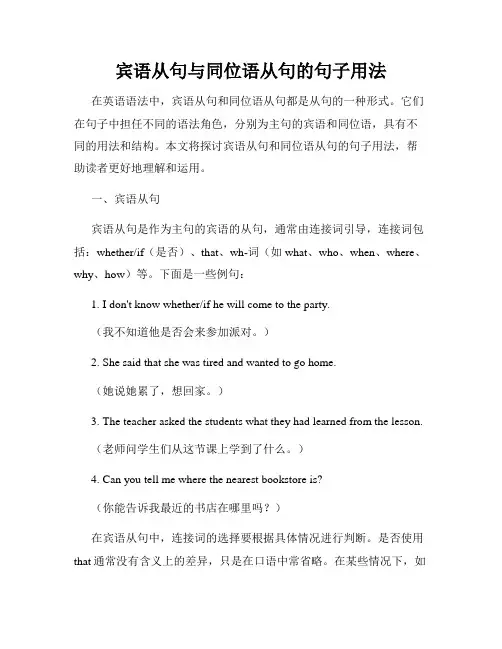
宾语从句与同位语从句的句子用法在英语语法中,宾语从句和同位语从句都是从句的一种形式。
它们在句子中担任不同的语法角色,分别为主句的宾语和同位语,具有不同的用法和结构。
本文将探讨宾语从句和同位语从句的句子用法,帮助读者更好地理解和运用。
一、宾语从句宾语从句是作为主句的宾语的从句,通常由连接词引导,连接词包括:whether/if(是否)、that、wh-词(如what、who、when、where、why、how)等。
下面是一些例句:1. I don't know whether/if he will come to the party.(我不知道他是否会来参加派对。
)2. She said that she was tired and wanted to go home.(她说她累了,想回家。
)3. The teacher asked the students what they had learned from the lesson.(老师问学生们从这节课上学到了什么。
)4. Can you tell me where the nearest bookstore is?(你能告诉我最近的书店在哪里吗?)在宾语从句中,连接词的选择要根据具体情况进行判断。
是否使用that通常没有含义上的差异,只是在口语中常省略。
在某些情况下,如表示选择、疑问或否定的宾语从句中,通常使用whether/if。
而引导词wh-词用于提问特定的信息。
二、同位语从句同位语从句是用于解释或说明名词或代词含义的从句。
它通常紧跟在名词或代词之后,具有进一步解释或限定的作用。
同位语从句常由that引导,但也可以由wh-词引导。
下面是一些例句:1. The fact that she passed the exam made her parents proud.(她通过考试的事实让她的父母感到骄傲。
)2. The question whether we should go on a vacation is still being discussed.(我们是否应该去度假的问题仍在讨论中。
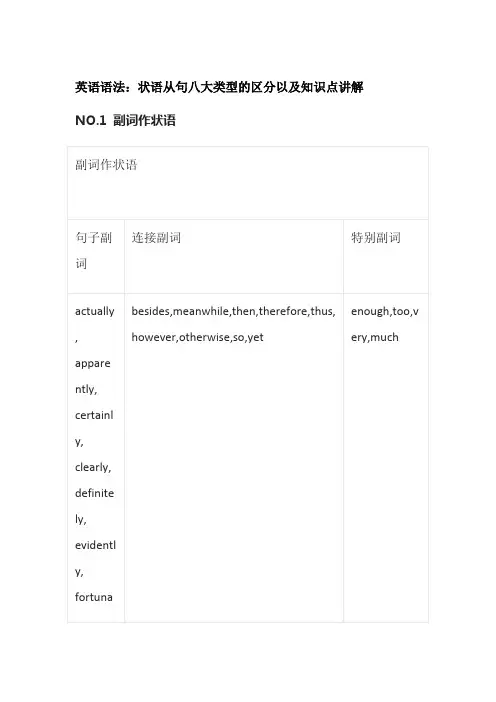
英语语法:状语从句八大类型的区分以及知识点讲解NO.1 副词作状语(1)句子副词:句子副词用于修饰句子(而不是修饰某个单个的词),反映说话人的观点和看法。
如actually, apparently, certainly, clearly,definitely, evidently, fortunately, frankly, honestly, luckily, obviously, perhaps, possibly, probably, surely, undoubtedly, unexpectedly 等。
作用以及位置:句子副词通常位于句首(或分句句首)。
Eg:Obviously he can't tell the difference between them. 显然他无法区别两者的不同。
I arrived late but luckily the meeting had been delayed. 我迟到了,幸而会议推迟了。
但有些句子副词也可以出现句中。
eg:He smiled nastily. He evidently knew something I didn't. 他发出狞笑,他显然知道一些我所不知道的事。
有的句子也可用作其他种类的副词,不过这往往会导致位置和语义的变化:Clearly he didn't say so. 显然他没有这样说。
(句子副词)He didn't say so clearly. 他说得没有那么清楚。
(方式副词)(2)起连词作用的副词连接副词就是连接词,如besides,meanwhile,then, therefore, thus, However,Otherwise, so, yet 等。
作用以及位置:常放在两个句子中间,前面为逗号,后面放连接词,从句之前。
注意:so 也可放在形容词之前做修饰,yet 可放句尾或从句之前。
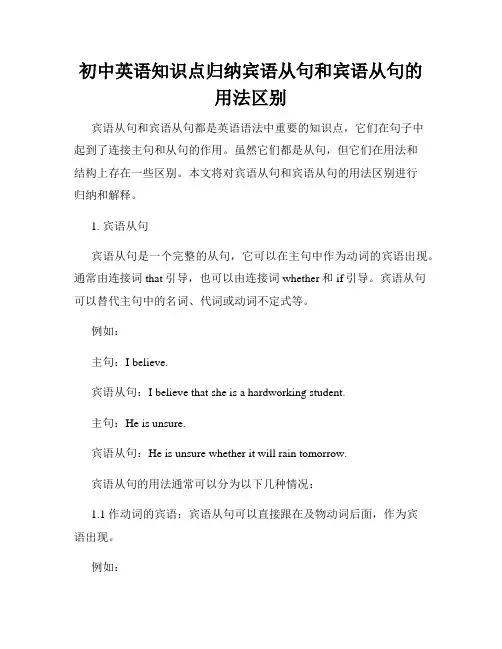
初中英语知识点归纳宾语从句和宾语从句的用法区别宾语从句和宾语从句都是英语语法中重要的知识点,它们在句子中起到了连接主句和从句的作用。
虽然它们都是从句,但它们在用法和结构上存在一些区别。
本文将对宾语从句和宾语从句的用法区别进行归纳和解释。
1. 宾语从句宾语从句是一个完整的从句,它可以在主句中作为动词的宾语出现。
通常由连接词that引导,也可以由连接词whether和if引导。
宾语从句可以替代主句中的名词、代词或动词不定式等。
例如:主句:I believe.宾语从句:I believe that she is a hardworking student.主句:He is unsure.宾语从句:He is unsure whether it will rain tomorrow.宾语从句的用法通常可以分为以下几种情况:1.1 作动词的宾语:宾语从句可以直接跟在及物动词后面,作为宾语出现。
例如:主句:They know.宾语从句:They know that he is coming tomorrow.1.2 作介词的宾语:宾语从句可以作为介词的宾语出现。
例如:主句:He is interested in.宾语从句:He is interested in what you said.1.3 作不及物动词的宾语补足语:宾语从句可以作为不及物动词的宾语补足语出现。
例如:主句:I think.宾语从句:I think she is right.2. 宾语从句宾语从句是一个不完整的从句,它通常缺少主语或谓语,需要依附在特定的动词后面。
常见的引导宾语从句的动词有ask, tell, wonder, know, learn, forget等。
宾语从句通常用于转述他人的话或询问别人的事情。
例如:主句:He asked.宾语从句:He asked what time it was.主句:I don't know.宾语从句:I don't know if he will come to the party.宾语从句的用法通常可以分为以下几种情况:2.1 间接引语:宾语从句用于转述他人的话,表示间接引语。
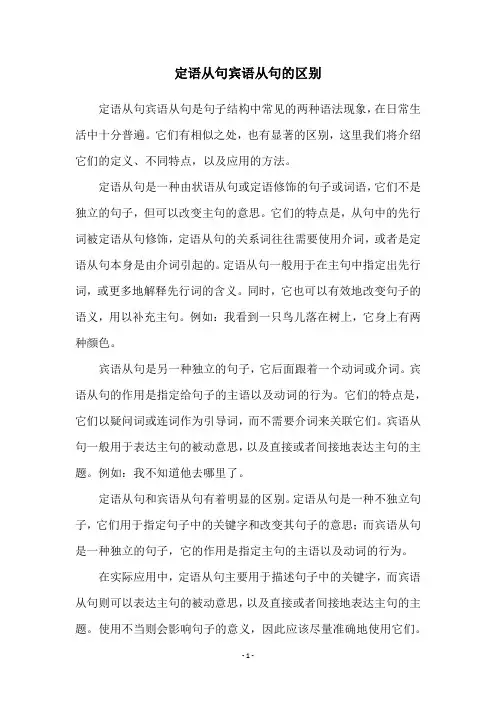
定语从句宾语从句的区别定语从句宾语从句是句子结构中常见的两种语法现象,在日常生活中十分普遍。
它们有相似之处,也有显著的区别,这里我们将介绍它们的定义、不同特点,以及应用的方法。
定语从句是一种由状语从句或定语修饰的句子或词语,它们不是独立的句子,但可以改变主句的意思。
它们的特点是,从句中的先行词被定语从句修饰,定语从句的关系词往往需要使用介词,或者是定语从句本身是由介词引起的。
定语从句一般用于在主句中指定出先行词,或更多地解释先行词的含义。
同时,它也可以有效地改变句子的语义,用以补充主句。
例如:我看到一只鸟儿落在树上,它身上有两种颜色。
宾语从句是另一种独立的句子,它后面跟着一个动词或介词。
宾语从句的作用是指定给句子的主语以及动词的行为。
它们的特点是,它们以疑问词或连词作为引导词,而不需要介词来关联它们。
宾语从句一般用于表达主句的被动意思,以及直接或者间接地表达主句的主题。
例如:我不知道他去哪里了。
定语从句和宾语从句有着明显的区别。
定语从句是一种不独立句子,它们用于指定句子中的关键字和改变其句子的意思;而宾语从句是一种独立的句子,它的作用是指定主句的主语以及动词的行为。
在实际应用中,定语从句主要用于描述句子中的关键字,而宾语从句则可以表达主句的被动意思,以及直接或者间接地表达主句的主题。
使用不当则会影响句子的意义,因此应该尽量准确地使用它们。
此外,学习定语从句宾语从句的最佳方法就是多加练习,多思考,尝试将它们应用到自己的句子中去,从而让自己更深入地理解它们的区别。
总之,定语从句宾语从句是句子结构中常见的两种语法现象,它们有着明显的区别,因此既要多练习,也要准确使用它们。
只有通过练习和努力,才能将这两种句子结构的区别学得深入,运用的更熟练。
定语从句宾语从句状语从句的结构区别
定语从句和宾语从句是两种从句的结构形式。
定语从句用来修饰一个名词或代词,对其进行进一步的解释说明。
它通常位于名词或代词之后,用来限定或补充其意义。
定语从句和主句之间用逗号隔开。
例如:那个穿红衣服的女孩是我姐姐。
宾语从句用来作为主句的动词或介词的宾语,表示被动的接受行为。
它通常位于主句中的动词或介词后面,用来表示主句所表达的内容。
宾语从句和主句之间不用逗号隔开。
例如:我不知道他什么时候会来。
状语从句用来修饰整个句子,对其进行时间、地点、原因、条件等方面的说明。
它通常位于主句之前或之后,用来表示主句发生的条件、原因、结果等情况。
状语从句和主句之间用逗号或连接词隔开。
例如:当我听到这个消息时,我感到非常震惊。
高中英语知识点归纳定语从句与主语从句的区别定语从句与主语从句是高中英语中常见的从句结构,它们在使用和功能上有着明显的区别。
本文将针对这两个从句的概念、用法和区别进行详细的归纳。
一、定语从句定语从句是用来修饰名词或代词的从句,它对被修饰的名词或代词起到进一步解释、限定或补充的作用。
定语从句通常由关系代词或关系副词引导,其中关系代词包括:that, which, who, whom, whose等;关系副词包括:where, when, why等。
定语从句一般紧跟在被修饰的名词或代词之后。
1. 关系代词引导的定语从句关系代词引导的定语从句可以在从句中充当主语、宾语、定语和状语等成分。
以下是一些例子:- The book that I borrowed from the library is very interesting.- I have a friend who is good at playing basketball.- This is the house which was built last year.2. 关系副词引导的定语从句关系副词引导的定语从句一般修饰地点、时间和原因等名词或代词,其中where表示地点,when表示时间,why表示原因。
以下是一些例子:- I still remember the place where we met for the first time.- Do you know the reason why she didn't come to the party?- This is the time when we should work harder.二、主语从句主语从句是用来充当句子的主语的从句,它在句子中起到句子的主语的作用。
主语从句通常由连接词that引导,但有时也可以由连接词whether或if引导。
主语从句通常位于句首作为主句的主语,或者位于动词后作为主句的宾语。
宾语从句与同位语从句的异同在英语语法中,宾语从句和同位语从句是两个常见的从句类型。
它们在句子结构和用法上有一些相似之处,但也存在一些明显的异同点。
本文将对宾语从句和同位语从句进行比较和总结,以便更好地理解和运用它们。
一、宾语从句宾语从句是作为主句的宾语出现的从句,通常用于表示动词后的宾语。
1. 句子结构:宾语从句一般由连接词引导,常见的连接词有:(1) 连接代词:that, whether, if等。
(2) 连接副词:how, when, where, why等。
宾语从句需要有主语和谓语,构成一个完整的句子。
2. 用法:宾语从句常用于以下情况:(1) 及物动词的宾语:例如,I know that he is a doctor.(2) 形容词的宾语:例如,I am happy that you passed the exam.(3) 名词的宾语:例如,She has no idea what to do.3. 语序:宾语从句的语序与陈述句或疑问句的语序相同,即主语在前,谓语在后。
特殊疑问句和一般疑问句在宾语从句中不需要变化。
二、同位语从句同位语从句是用来解释或补充说明先行词的从句,通常放在名词后面,起到同位语的作用。
1. 句子结构:同位语从句一般由连接词that引导,连接词that在同位语从句中没有实际的意义,仅起连接作用。
2. 用法:同位语从句常用于以下情况:(1) 说明名词的具体内容或含义:例如,The fact that he passed the exam surprised me.(2) 解释名词的性质或特点:例如,Her belief that everyone deserves equal opportunities is admirable.(3) 补充说明名词的身份或身份:例如,His claim that he is innocent is being investigated.3. 语序:同位语从句的语序通常保持与原句相同。
定语从句与状语从句的区别与联系定语从句和状语从句都是从属从句,用来修饰主句中的名词或句子。
它们在语法结构和功能上有一些区别和联系。
本文将介绍定语从句和状语从句的区别和联系,以便更好地理解和使用它们。
一、定语从句定语从句是用来修饰名词或代词的从句,在句中作定语,起到限定或说明名词或代词的作用。
下面是一些定语从句的特点:1. 位置:定语从句通常紧跟在被修饰的名词或代词后面,形成一个整体修饰名词或代词。
2. 引导词:定语从句的引导词有关系代词和关系副词两种形式。
关系代词包括:who, whom, which, that, whose等;关系副词包括:when, where, why等。
3. 功能:定语从句起到对名词或代词的补充和说明作用,进一步限定名词或代词的意义。
例句:The book that you lent me is very interesting.二、状语从句状语从句是用来修饰动词、形容词、副词或整个句子的从句,它在句中并不起限定名词的作用,而是用来说明动作、状态或条件等。
下面是一些状语从句的特点:1. 位置:状语从句可以位于主句的前面、中间或后面,用来修饰整个句子或其中的部分成分。
2. 引导词:状语从句的引导词有一些特定的词汇,比如:when, while, before, after, since, as, although, because等。
3. 功能:状语从句起到对动作、状态或条件的说明和补充作用。
例句:He went to bed early because he was tired.三、区别与联系虽然定语从句和状语从句都是从属从句,但在功能和位置上有一些区别:1. 功能区别:定语从句用来修饰名词或代词,起到对其进行补充和限定的作用;而状语从句用来修饰动词、形容词、副词或整个句子,对动作、状态或条件进行说明和补充。
2. 位置区别:定语从句紧跟在被修饰的名词或代词后面,形成一个整体;状语从句可以位于句子的前面、中间或后面,用来修饰整个句子或其中的部分成分。
状语从句和定语从句的区别状语从句和定语从句是英语语法中常用的两种从句类型,它们在句子中扮演不同的角色,并且有一些明显的区别。
本文将详细讨论状语从句和定语从句之间的区别。
一、状语从句状语从句是一种从属于主句的从句,用来修饰主句中的动词、形容词、副词或整个句子。
状语从句通常表达时间、条件、原因、目的、方式和结果等与主句之间的关系。
以下是状语从句的一些特点:1. 位置:状语从句通常位于主句之前或之后,并且被逗号、引号或连词连接。
2. 功能:状语从句常常用来表达时间、条件、原因、目的、方式和结果等。
3. 结构:状语从句的引导词包括常见的连词如when, while, if, because, so that等。
举例来说,以下是一些状语从句的使用:- 时间状语从句:When I arrived, they were already eating dinner.(当我到达时,他们已经在吃晚饭了。
)- 条件状语从句:If it rains tomorrow, we will stay indoors.(如果明天下雨,我们将呆在室内。
)- 原因状语从句:Because she studied hard, she passed the exam.(因为她努力学习,所以她通过了考试。
)- 目的状语从句:I bought some snacks so that we can enjoy them during the movie.(我买了一些零食,这样我们可以在看电影时享用。
)- 方式状语从句:He speaks as if he knows everything.(他说话的样子好像什么都知道。
)- 结果状语从句:The baby was crying, so I picked her up.(婴儿在哭,所以我抱起了她。
)二、定语从句定语从句也是一种从属于主句的从句,用来修饰主句中的名词或代词。
定语从句通常提供额外的信息,对主句中的名词或代词进行限定或描述。
定语从句与六种易混句型巧区分 一、 定语从句是高中阶段的重点语法项目之一。因此,同学们有必要全面弄清其用法。定语从句从句型上讲,它与六种句式相似,十分容易混淆。为了帮助同学们分清定语从句与这六种句型的差异,现将其分类例析如下。
定语从句与六种易混句型巧区分 一、 定语从句是高中阶段的重点语法项目之一。因此,同学们有必要全面弄清其用法。定语从句从句型上讲,它与六种句式相似,十分容易混淆。为了帮助同学们分清定语从句与这六种句型的差异,现将其分类例析如下。
一、定语从句与并列句 1.用一个恰当的词完成下列句子,使之完整与正确。 ①Mr Li has three daughters,none of _____ is an engineer. ②Mr Li has three daughters,but none of _____ is a dancer. ③Mr Li has three daughters; _____ are doctors. 定语从句与并列句的主要区别在于:并列句有像and,but,so等并列连词或两个句子用分号连接,这时就不能再用引导定语从句的关系词了。
二、 定语从句与地点状语从句 1. 用一个恰当的词完成下列句子,使之完整与正确。 ①Rice doesn't grow well _____ there is not enough water. ②I still remember the farm _____ my parents worked ten years ago. 定语从句与地点状语从句的主要区别在于:定语从句有表示地点的先行词,而地点状语从句则没有;定语从句的关系词根据需要可用“介词+which”来代替where,而地点状语从句则通常只能由 where引导。
三、定语从句与强调句 1.用一个恰当的词完成下列句子,使之完整与正确。 ①It is on the morning of May 1st __ I met Liang Wei at the airport. ②It is the factory ___ Mr Wang works. 强调句与定语从句的区别 【原题复现】27.It was from only a few supplies that she had bought in the village_____the hostess cooked such a nice dinner.
A. where B.that C.when D. which 【语法补漏】 强调句与定语从句的区别是:在定语从句中一般使用关系代词that, which,who, whom或关系副词when, where,why等,先行词(中心词)一般是名词或名词短语,而在强调句中,可以用副词、介词短语或从句来作被强调的内容。;而在强调句中则主要使用that,who;
有时强调句在形式上和定语从句、状语从句很相似。我们除了从意思上进行区分外,还能根据强调句的结构特点来进行判断,如能去掉It was...that...后,句子仍然通顺,就是强调句。这一点很重要.
试比较: ①It is a question that needs careful consideration. ②It is novels that Miss Williams enjoys reading. 简析:句①是含有定语从句的句子,在此It是指示代词,It is a question是个"主语+系动词+表语"结构,如果去掉It is...that,句子结构就不完整了。句②是强调句,在此It是个引导词,没有具体含义,如果去掉It is...that,把语序稍加调整,句子结构仍然是完整的。
区分定语从句与强调句 区分定语从句和强调句可用还原法,因为强调句的基本句式为 It is (was)+被强调部分+that+句子的其余部分,因此只需将it is(was) 后面的部分还原到原来的句子中,如果成份完整,则为强调句,如果成份不完整则为定语从句。 1) It is this street _______I happened to meet him.
It is in this street _______I happened to meet him. A.that B.where C.which D.from which 首先,我们看到主句部分为 it is…结构,可能是定语从句可能是强调句,利用还原法,将两部分分别还原,得出1.I happened to meet him this street. 2.I happened to meet him in this street. 1句子成份不完整,为定语从句,用where;2句子成份完整为强调句,选that。 2) Where did you meet him? It is in the cinema_______ I met him. It is in the cinema_______ door faces west. [ ] A.that B.where C.whose D.which 仍然采取还原法,得出1.I met him in the cinema. 2.Door faces west in the cinema. 1句子成份完整,确定为强调句,用that选A;2明显不是一个意思表达清楚的句子,其实本句是一个省略句,全句为:It is in the cinema _______door faces west that I met him. 强调句部分已经省略,而句中door faces west 是一个定语从句,表示门朝西开的电影院,因此选C,whose 在做题中我们经常可以看见带有定语从句的强调句,这时仍可用还原法加以辨别: (1) Was it in the cinema _______Smith met you _______you saw the film?
A.that, that B.whom, then C.where, that D.which, where (2) Where did you found XingMing? It was in the office _______he worked. A.this B.which C.where D./ 【高考题互动】 01、(08全国卷II’ 20) It was in New Zealand ___ Elizabeth first met Mr. Smith. A. that B. how C. which D. when 02、 08)It was along the Mississippi River _______ Mark Twain spent much of his childhood.
A. how B. which C. that D. where 定语从句与强调句的主要区别在于:强调句的结构为“It is/was+被强调部分+that+从句”。被强调部分可以是除谓语以外的任何成分,当被强调部分是人时,还可用who代替that。这一句型中,一定不能因为被强调部分是表时间或地点的词就用when或where代替 that。
三、 定语从句与结果状语从句 1. 用一个恰当的词完成下列句子,使之完整与正确。 ② I have the same computer _____ you have. ②She is such a kind and funny girl _____ all of us like to make friends with her. 定语从句与结果状语从句的主要区别在于(这里只讨论the same...as/that和such...as/that两种情况):在这两种情况下,如果as/that既引导从句,同时又在从句中充当一定的成分,则as/that引导的是定语从句。在the same...as/that结构中,用as指一样的,但不是同一个事物;用that指同一物品,
五、定语从句与习惯句型 1.用一个恰当的词完成下列句子。 ①It is the first time _____ she has been in Shanghai. ②It was the time ____ Chinese people had a hard life. 六、定语从句与单句 1.用一个恰当的词完成下列句子。 ①The mother told the lazy boy to work,_____ didn't help. ②The mother told the lazy boy to work._____ didn't help. ②She is such a kind and funny girl _____ all of us like to make friends with her. 定语从句与结果状语从句的主要区别在于(这里只讨论the same...as/that和such...as/that两种情况):在这两种情况下,如果as/that既引导从句,同时又在从句中充当一定的成分,则as/that引导的是定语从句。在the same...as/that结构中,用as指一样的,但不是同一个事物;用that指同一物品,
名词性从句的考点剖析 一.在句中起名词作用的从句叫名词性从句,它包括主语从句、宾语从句、表语从句和同位语从句 二.如何判断为名词性从句
1.充当主语的从句为主语从句。